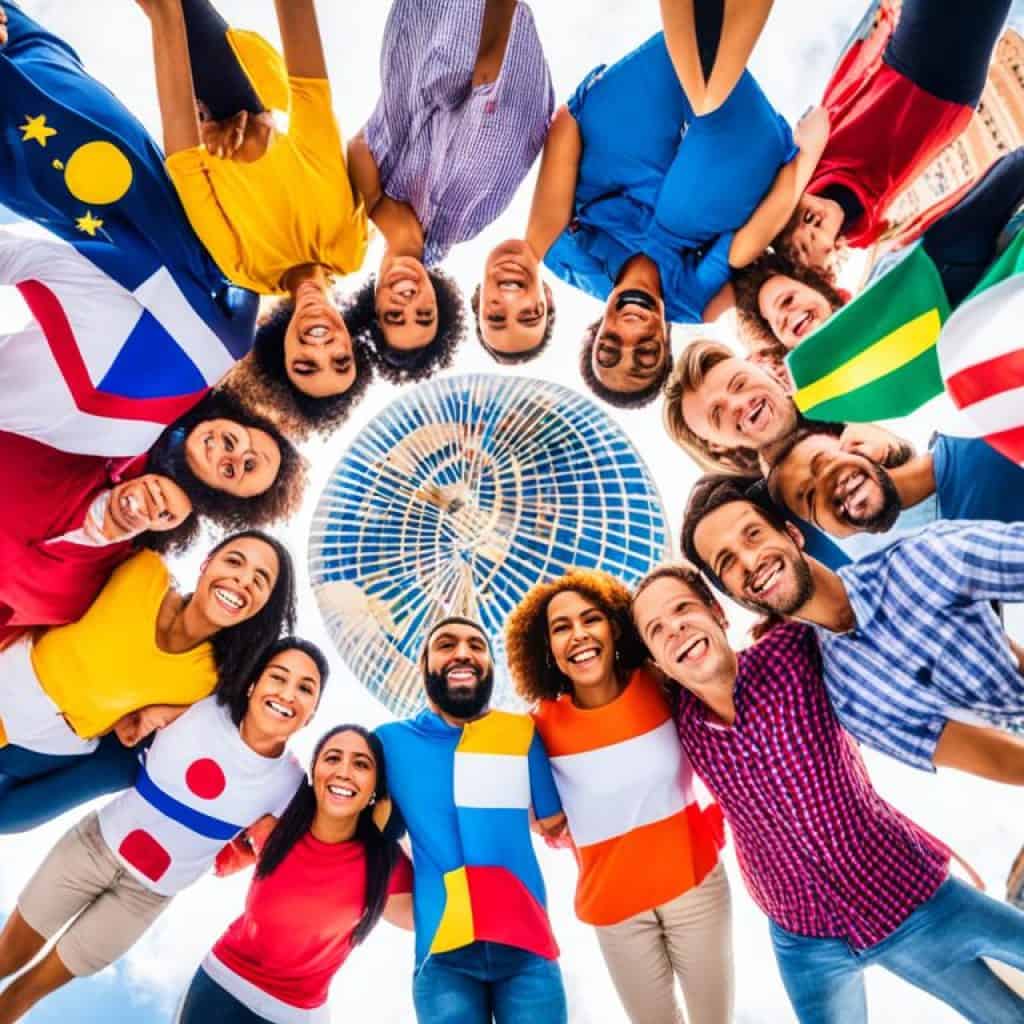Key Takeaways:
- An expat is someone who lives outside their native country and embraces the global stage.
- Being an expat involves experiencing new cultures and seeking personal growth.
- Expats are often driven by professional advancement and new experiences.
- They form tight-knit communities with fellow expats for support in a foreign country.
- Expats navigate a complex terrain of cultural identity while adapting to new surroundings.
What is an Expat?
An expat, short for expatriate, is someone who has chosen to live outside their native country for an extended period of time. Unlike tourists who visit a country for a short period, expats make a long-term commitment to living abroad and fully immersing themselves in the culture and lifestyle of their new home.
While expats may share similarities with tourists in terms of exploring new surroundings, their intention goes beyond temporary enjoyment. Expats often seek personal and professional growth, seeking to create a meaningful life outside their home country. They embrace the challenges and opportunities that come with living in a foreign land, fostering connections and experiences that can last a lifetime.
Being an expat is a choice that reflects a desire for a global perspective and a willingness to embrace diversity. It is a transformative journey that requires adaptability, curiosity, and the ability to navigate unfamiliar territory. Expat life offers the chance to expand horizons, challenge assumptions, and open doors to new opportunities.
“Living abroad is not just about changing your surroundings, but also about changing yourself.”
The expat experience encompasses a wide range of individuals, each with their own unique backgrounds, motivations, and aspirations. Some expats may be pursuing career opportunities in multinational companies, while others may be retirees seeking a better quality of life. Regardless of their circumstances, expats contribute to the cultural fabric of both their host country and their country of origin.
Expat Synonym and Antonym
An expat is often used interchangeably with other terms such as expatriate. While there is no direct antonym for expat, the opposite concept can be referred to as a non-expat or a local resident.
Expatriate
The term expatriate is synonymous with an expat and is used to describe individuals living outside their home country. It shares the same essence and meaning, highlighting the transformative experience of living abroad.
Expat vs. Immigrant: Understanding the Difference
While the terms “expat” and “immigrant” are often used interchangeably, it’s important to understand the subtle yet significant distinctions between the two.
An expat is someone who temporarily lives outside their home country, typically driven by professional advancement and personal growth. Expats embrace the opportunity to experience different cultures, gain international work experience, and broaden their horizons. They have a shorter length of stay and may eventually return to their home country.
On the other hand, an immigrant is someone who moves to a foreign country with the intention of establishing permanent residency. Immigrants often seek a better life for themselves and their families, escaping political unrest, economic instability, or limited opportunities in their home country. They have a long-term perspective and aim to integrate fully into their new society.
The distinction between expats and immigrants lies in their length of stay and level of integration. Expats often maintain a connection to their home country and may not fully assimilate into the local culture. In contrast, immigrants focus on building a new life in their adopted country, learning the language, embracing traditions, and seeking citizenship.
“The expat leaves home to seek his fortune elsewhere. The immigrant comes to find his fortune but may also feel the need to justify the choice.” – Pico Iyer
Integration plays a significant role in differentiating expats from immigrants. Expats tend to rely on expatriate communities for support, while immigrants strive to establish connections with locals. Immigrants often face challenges related to cultural adaptation, language barriers, and navigating the complex systems of their new country.
While both expats and immigrants contribute to the cultural diversity of the countries they reside in, understanding the distinctions between the two allows for more nuanced discussions on migration, societal integration, and the reform of expat policies.
By recognizing the unique motivations, goals, and experiences of expats and immigrants, we can foster inclusive communities that embrace diversity and provide support for individuals pursuing lives beyond their borders.
Motivations and Intentions of Expats and Immigrants
When it comes to embarking on a new journey in a foreign land, expatriates and immigrants have distinct motivations and intentions that drive their decision. Understanding these underlying factors can shine a light on the different aspirations and goals that individuals have when they choose to live outside their native country.
Expatriate Motivations:
Expats are often fueled by the desire for professional advancement, personal growth, and the opportunity to embrace new experiences. They seek excitement, change, and the chance to explore uncharted territories. Whether it’s the allure of working in a global company, pursuing career opportunities in another country, or simply seeking a different lifestyle, expats are driven by a thirst for growth and expanding horizons.
Immigrant Motivations:
On the other hand, immigrants are motivated by the pursuit of a better life, stability, and increased opportunities for themselves and their families. Moving to a new country is often seen as a means to create a new home and forge strong connections in search of a brighter future. Immigrants seek a supportive environment where they can build a solid foundation, establish themselves economically, and provide a safe and prosperous life for their loved ones.
In summary, while expatriates are propelled by professional advancement and personal growth, immigrants are primarily focused on creating a stable and improved quality of life for themselves and their families. These differing motivations shape their journeys and experiences in a foreign land, contributing to the diverse tapestry of the expat and immigrant communities.
Social Networks and Connections for Expats and Immigrants
Expats and immigrants often find solace in building social networks and connections in their new countries. While each group has different approaches to building these connections, the ultimate goal is the same – to feel a sense of belonging and support in unfamiliar surroundings.
Expats and Social Connections
“Being an expat can be both exciting and challenging. Expats often face the difficulties of adapting to a new culture and language, which can lead to feelings of isolation. However, expatriate communities provide a supportive environment where individuals can connect with others who share similar experiences and challenges.”
Expatriate communities are formed by expats from various countries who come together to create a sense of home away from home. These communities provide a platform for expats to connect, share advice, and create lasting friendships. They organize social events, language exchanges, and cultural celebrations to foster a sense of community and camaraderie.
Expatriate communities often have online forums, social media groups, or dedicated websites where expats can ask questions, seek advice, or simply find like-minded individuals. These platforms serve as virtual support networks, offering a space for expats to share their experiences, offer guidance, and find companionship.
Expats also form connections with locals in their new countries. This allows them to immerse themselves in the local culture, learn the language, and gain a deeper understanding of their new surroundings. Building relationships with locals enables expats to find a sense of belonging and expand their social circles beyond expatriate communities.
Immigrants and Local Connections
“For immigrants, building connections with both fellow immigrants and locals is essential to creating a well-rounded life in a new country. By forging relationships with people from different backgrounds, immigrants can integrate into the local community while still preserving their heritage.”
Immigrants often seek out local gatherings, cultural festivals, and community centers to connect with locals and fellow immigrants. These interactions allow immigrants to embrace the traditions and customs of their new home while also sharing their own cultural heritage.
Language exchange programs and community language classes are valuable resources for immigrants looking to improve their language skills and connect with locals who are interested in learning their native language. These language exchanges serve as a mutual learning experience, fostering cultural exchange and building connections between different communities.
Additionally, many immigrants find support and guidance through immigrant support organizations or settlement agencies. These organizations provide resources and programs to assist immigrants in their journey of settling in a new country, including workshops, mentorship programs, and social integration events.
Overall, both expats and immigrants understand the importance of building social connections in their new environments. Expatriate communities offer a sense of familiarity and support for expats, while immigrants strive to bridge the gap between their heritage and their new home by forming connections with both fellow immigrants and locals. By nurturing these social networks, both groups can create meaningful relationships and feel a greater sense of belonging in their adopted countries.

| Expats | Immigrants |
|---|---|
| Tight-knit expatriate communities | Integration into local communities |
| Supportive online platforms | Local gatherings and cultural festivals |
| Connections with locals | Language exchange programs |
| Immigrant support organizations |
Cultural Perception and Identity for Expats and Immigrants
Expats and immigrants often find themselves navigating a complex terrain when it comes to their sense of cultural identity. While both groups experience the challenges and rewards of living in a new country, their journeys towards establishing and preserving their cultural identity differ.
For expats, the journey involves striking a delicate balance between holding onto their customs and traditions from their home country, while also adapting to the culture of their host country. This process allows expats to embrace the richness of their own heritage while immersing themselves in the vibrant tapestry of the new culture they have chosen to explore. It is a continuous process of bridging two worlds and finding personal harmony between preserving one’s roots and embracing new surroundings.
“Being an expat means embracing the beauty of cultural diversity and using it as a way to broaden our understanding of the world.” – Jane Smith, Expatriate in France
On the other hand, immigrants embark on an ongoing evolution of their cultural identity. As they transition to a new country, they learn new languages, adapt to unfamiliar surroundings, and strive to preserve their heritage. For immigrants, embracing the culture and customs of their new home country becomes intertwined with preserving their unique cultural heritage. They often participate actively in their cultural communities, attend events and celebrations, and pass down their traditions to future generations.
Throughout their journeys, both expats and immigrants play a vital role in preserving cultural heritage and fostering a deeper understanding between different communities. Their experiences and perspectives enrich their new surroundings, creating a cross-pollination of ideas and promoting a more interconnected global society.
The Importance of Preserving Heritage
Preserving one’s cultural heritage is not just important for individuals; it also contributes to the cultural diversity and vibrancy of societies worldwide. When expats and immigrants honor their traditions, they bring a unique flavor to their adopted countries, fostering a sense of appreciation and respect for different cultures. This exchange of cultural values and practices creates a melting pot of ideas that drives social progress, innovation, and inclusivity.
Adapting to New Surroundings
At the same time, both expats and immigrants face the challenge of adapting to new surroundings. This process of adjustment requires a level of openness and resilience as they navigate unfamiliar social norms, language barriers, and cultural expectations. By embracing the culture of their new home country, they can forge deeper connections with the local community and gain a deeper understanding of the society they now call home.
| Expats | Immigrants | |
|---|---|---|
| Preserving Heritage | Adapting while preserving cultural roots | Preserving heritage while embracing new surroundings |
| Identity Journey | Balancing multiple cultural identities | Ongoing evolution of cultural identity |
| Contribution to Culture | Fostering appreciation for diversity | Enriching cultural diversity |
Both expats and immigrants play a significant role in shaping the cultural landscape of their host countries. By celebrating their heritage and adapting to new surroundings, they contribute to the vibrancy and interconnectedness of our global society.
Expat Myths and Misconceptions
Being an expat is often surrounded by myths and misconceptions. Let’s clear the air and debunk some common misconceptions to promote a better understanding of the expat lifestyle.
Myth 1: Giving up Citizenship
Contrary to popular belief, becoming an expat does not require giving up one’s citizenship. Many countries allow individuals to hold dual citizenship, giving expats the freedom to maintain their ties to their home country while embracing their new international experience.
Myth 2: Healthcare Abroad
Another myth is that healthcare abroad is of lower quality or more expensive than in one’s home country. In reality, healthcare standards vary across the globe, and many countries offer excellent medical services and treatments. Expats often find that healthcare in their new country can be as good, if not better, than what they had access to back home.
Myth 3: Safety Abroad
Safety is a top concern for many potential expats. While it’s true that safety can vary from country to country, it’s important to note that many countries provide equal or even greater levels of safety compared to one’s home country. By taking proper precautions and staying informed, expats can enjoy a safe and secure living environment.
“Becoming an expat does not mean giving up your citizenship or sacrificing your access to quality healthcare and safety. These myths can discourage individuals from exploring the incredible opportunities that the expat lifestyle has to offer.”
It’s essential to dispel these myths to encourage a more accurate understanding of what being an expat truly entails. Expats can maintain their citizenship, access high-quality healthcare, and enjoy a safe and fulfilling life abroad.

Expatriate Myths and Realities
| Myth | Reality |
|---|---|
| Expats must give up their citizenship. | Dual citizenship is often allowed, allowing expats to maintain their ties to their home country. |
| Healthcare abroad is of lower quality. | Many countries offer high-quality healthcare services that can be more affordable than in their home countries. |
| Living abroad is less safe than in one’s home country. | Safety levels vary, but many countries offer equal or greater safety than one’s home country. |
The History of Expats
Humans have been moving from one part of the planet to another since prehistoric times. The concept of expatriation, or living outside one’s native country, has a rich history that can be traced back to the Age of Discovery and the era of colonization.
During the Age of Discovery, explorers ventured into unknown territories in search of new trade routes, resources, and cultural exchanges. The colonization of new lands brought about the establishment of settlements and the migration of settlers from their home countries.
Expats have been romanticized in various historical periods. In the 1920s, the “Lost Generation” of expatriate writers and artists, including Ernest Hemingway and F. Scott Fitzgerald, sought inspiration and a sense of freedom in the cosmopolitan cities of Paris and other European capitals.
âParis is a moveable feast.â – Ernest Hemingway
The era of the “Jet Set” from the 1950s to the 1970s saw an increase in international travel and the emergence of a globetrotting elite. Luxury destinations such as the French Riviera and the Caribbean became popular havens for wealthy expats seeking a glamorous lifestyle.
Today, the expat community continues to thrive, with numerous celebrity expats choosing to live in other countries for various reasons. These individuals often cite a desire for a change of scenery, a different cultural experience, or simply the opportunity to explore new horizons.
| Name | Nationality | Country of Residence | Reason for Expatriation |
|---|---|---|---|
| Gertrude Stein | American | France | Literary and Artistic Freedom |
| David Bowie | British | United States | Career Opportunities and Creative Inspiration |
| Tina Turner | American | Switzerland | Privacy and Quality of Life |
| George Clooney | American | Italy | Cultural Affinity and Escape from Paparazzi |
Types of Expats
When it comes to expats, there is a diverse range of individuals who choose to live and work abroad. Whether they are driven by career opportunities, a nomadic lifestyle, or a desire for a fulfilling retirement, these expats contribute to the vibrant global community. Here are some of the main types of expats:
Individual Expats
Individual expats are professionals who work for multinational companies or organizations. They may be assigned to overseas branches or projects, bringing their expertise and skills to different parts of the world. These expats often have specific qualifications or talents that make them highly sought after.
Remote Workers
Remote workers are a growing group of expats who leverage technology to work from anywhere in the world. With advancements in digital communication and flexible work arrangements, remote work has become increasingly popular. These expats have the freedom to choose their location and enjoy the benefits of a location-independent lifestyle.
Digital Nomads
Digital nomads live a truly mobile lifestyle, constantly moving from one place to another while working remotely. These innovative expats often rely on their digital skills and creativity to sustain their nomadic lifestyle. They embrace adventure, cultural immersion, and the freedom to explore different countries.
Retired Expats
Retired expats choose to live in other countries during their retirement years. They may seek a lower cost of living, better healthcare, and a higher quality of life. These expats have the luxury of time to fully embrace the culture, traditions, and leisure activities of their new home. Many popular retirement destinations offer favorable tax regimes and a welcoming environment for retirees.
As the world becomes more interconnected and remote work gains popularity, the expat community continues to grow. Each type of expat brings unique experiences and contributes to the vibrant tapestry of global cultures.
Expats with Jobs
A significant percentage of expats are professionals or skilled workers employed by multinational companies, governments, or other organizations. They are often assigned to work in branch offices or projects abroad. This global workforce of working expats contributes to the international expansion of businesses and the exchange of knowledge and expertise across borders.
Many multinational companies rely on the talent and experience of expats to establish and manage their international operations. These professionals bring a diverse range of skills and perspectives to their roles, helping organizations navigate cultural differences, language barriers, and local regulations. Governments also often employ expats in various capacities, such as diplomats, consultants, or advisors, to strengthen international relations and promote economic growth.
Working abroad as an expat presents unique opportunities for personal and professional development. It allows individuals to gain valuable cross-cultural experiences, expand their networks, and enhance their career prospects. Additionally, working for a multinational company or government in a foreign country can provide a competitive edge in the global job market.
The presence of expats in branch offices or projects abroad is not limited to specific industries. From finance to technology, healthcare to education, expats are an integral part of many sectors. Some countries even have a higher expat population than locals, indicating the global nature of certain industries and the appeal of working abroad.
While expat assignments may come with challenges such as adapting to a new work environment and overcoming language barriers, the rewards of working as an expat often outweigh the difficulties. Expats have the opportunity to develop cross-cultural collaboration skills, build international networks, and gain a deeper understanding of global markets. These experiences can enrich their professional lives and open doors to new career opportunities.
Top Countries with a High Population of Working Expats
| Country | Expatriate Population (in millions) |
|---|---|
| United Arab Emirates | 8.1 |
| Switzerland | 2.3 |
| Singapore | 2.1 |
| Saudi Arabia | 1.9 |
| Qatar | 1.8 |
Source: Worldatlas
This table highlights the countries with a high population of working expats. These destinations attract professionals from around the world due to their economic opportunities, quality of life, and favorable business environments.
Whether it’s for career advancement, the thrill of experiencing new cultures, or the chance to make a global impact, working as an expat offers a unique and fulfilling professional journey. It is an opportunity to broaden horizons, gain valuable skills, and make lifelong connections with people from diverse backgrounds.
Expats Who Don't Need Jobs
Retired expats form a significant portion of the expat community, choosing to live abroad to enjoy a lower cost of living and a higher standard of living. This trend is particularly prevalent among baby boomers who seek a fulfilling retirement experience. By retiring abroad, these individuals can stretch their retirement savings further and enjoy a higher quality of life in a new environment.
Retired expats often benefit from social security benefits provided by their home country, supplementing their income and ensuring financial stability. These benefits provide a reliable source of income, allowing retirees to comfortably support themselves while enjoying their retirement abroad.
Another advantage for retired expats is the availability of Medicare coverage. While Medicare typically only provides coverage within the United States, many retired expats can still receive healthcare benefits by utilizing the Medicare programs available in their new country of residence. This allows retirees to enjoy quality healthcare services at a reduced cost, enhancing their overall well-being and peace of mind.
Key Benefits for Retired Expats:
- Lower cost of living
- Social security benefits
- Medicare coverage
- Higher standard of living
Retired expats have the opportunity to embrace a fulfilling retirement experience while enjoying a lower cost of living and access to quality healthcare. This lifestyle choice allows individuals to make the most of their retirement savings and create a comfortable and enjoyable life abroad.
| Retired Expats | Social Security Benefits | Medicare Coverage | Lower Cost of Living |
|---|---|---|---|
| Enjoy a fulfilling retirement experience | Supplement income and ensure financial stability | Access healthcare benefits in new country of residence | Stretch retirement savings further |
Expat Myths Debunked
In order to fully understand the expat lifestyle, it is important to debunk common myths and misconceptions surrounding it. Don’t let false information deter you from considering a life abroad. Let’s address some of the most prevalent expat myths:
Myth 1: Moving Abroad Requires Giving Up Citizenship
Reality: Dual citizenship is possible in many countries.
Contrary to popular belief, moving abroad as an expat does not require giving up your citizenship. Many countries allow individuals to hold dual citizenship, enabling you to maintain your ties to your home country while also enjoying the benefits of living abroad.
Myth 2: Healthcare Abroad is Inferior
Reality: Healthcare abroad can be of high quality and cost-effective.
Another misconception is that healthcare abroad is of inferior quality compared to your home country. In reality, many countries offer excellent healthcare systems that are on par with, or even superior to, those found elsewhere. Additionally, healthcare costs can often be more affordable, providing access to comprehensive medical care without breaking the bank.
Myth 3: Safety Abroad is a Concern
Reality: Many countries offer equal or greater safety than your home country.
The notion that living abroad is inherently unsafe is yet another myth that needs to be debunked. While safety levels vary from country to country, it is important to remember that many expat destinations boast crime rates that are either on par or lower than those in your home country. By researching and exercising caution, it is possible to find a safe and secure environment to call home.
“Don’t let misconceptions hold you back. Embrace the expat lifestyle and unlock a world of opportunities, without compromising your citizenship, healthcare, or safety.”
By addressing these expat myths, we can create a clearer understanding of what it means to be an expat. Moving abroad does not require giving up your citizenship, and many countries allow for dual citizenship. Healthcare abroad can be of high quality and more cost-effective, while safety abroad can be on par or even superior to your home country. These facts should encourage you to explore the expat lifestyle and take advantage of the opportunities it offers.
Now that we have debunked these common expat myths, let’s explore the rich history of expatriation in the next section.

Conclusion
The expat lifestyle opens doors to a world of opportunities for personal and professional growth, allowing individuals to immerse themselves in diverse cultures and expand their horizons. By embracing new experiences and venturing beyond the borders of their native country, expats have the chance to create a truly fulfilling life.
Whether driven by career prospects, retirement plans, or a thirst for adventure, becoming an expat offers a transformative journey. It allows individuals to step outside their comfort zone, adapt to new surroundings, and develop a stronger sense of self.
An expat lifestyle is a rich tapestry woven with the threads of exploration, cultural immersion, and personal development. It encourages individuals to seize every opportunity, to embrace the unknown, and to broaden their understanding of the world.
FAQ
What is the definition of an expat?
An expat is someone who lives outside their native country for an extended period of time.
What is the difference between an expat and an immigrant?
An expat is someone who lives outside their home country temporarily, while an immigrant moves to a foreign country with the intention of establishing permanent residency.
What motivates expats and immigrants to live abroad?
Expats are often motivated by professional advancement and personal growth, while immigrants seek a better life and stability for themselves and their families.
Do expats and immigrants form different types of social connections?
Expats often form tight-knit communities with fellow expats, while immigrants aim to build connections with both fellow immigrants and locals.
How do expats and immigrants navigate their sense of identity?
Expats hold onto customs from their home country while adapting to the culture of their host country, while immigrants go through an ongoing evolution in terms of their identity.
What are some common myths about being an expat?
Some common myths include the idea that expats must give up their citizenship, that healthcare abroad is inferior, and that safety abroad is always a concern.
What is the history of expats?
The idea of expatriation emerged during the Age of Discovery and was influenced by the colonization of new territories.
What are the different types of expats?
There are individual expats, remote workers, digital nomads, and retired expats seeking a lower cost of living and a higher quality of life.
What types of jobs do expats have?
Many expats are professionals or skilled workers employed by multinational companies, governments, or other organizations.
Can expats live abroad without needing a job?
Yes, there are many retired expats who choose to live abroad for a more affordable cost of living and a higher standard of living.
Are there any misconceptions about being an expat?
Yes, some misconceptions include the idea that expats must give up their citizenship, that healthcare abroad is inferior, and that safety abroad is always a concern.
What are the benefits of the expat lifestyle?
The expat lifestyle offers opportunities for personal and professional growth, the chance to immerse oneself in different cultures, and the ability to expand one’s horizons.


















Add comment